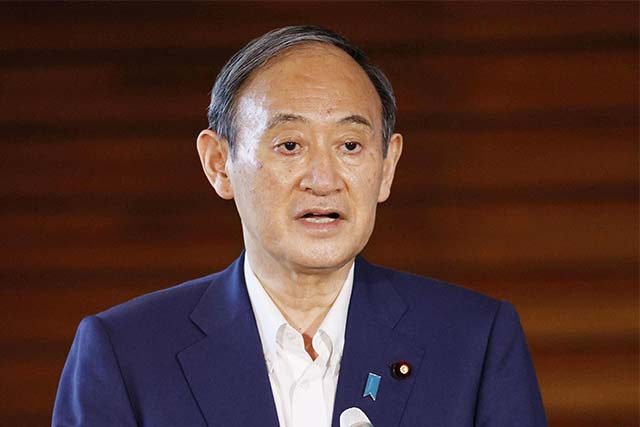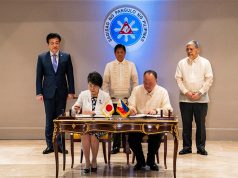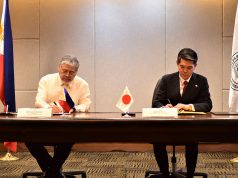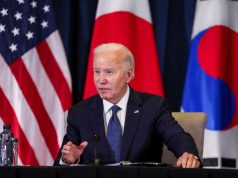
- Suga’s resignation sparks wide open succession race
- Former defense minister Kono throws hat into the ring-media
- Former foreign minister Kishida already in the running
- Former defense minister Ishiba considering a run
TOKYO — Japanese Prime Minister Yoshihide Suga said in a surprise move on Friday he would step down, setting the stage for a new premier after a one-year tenure marred by an unpopular COVID-19 response and sinking public support.
Suga, who took over after Shinzo Abe resigned last September citing ill health, has seen his approval ratings drop below 30% as the nation struggles with its worst wave of COVID-19 infections ahead of a general election this year.
Suga did not capitalize on his last major achievement – hosting the Olympics, which were postponed months before he took office as coronavirus cases surged.
His decision not to seek reelection as ruling Liberal Democratic Party (LDP) president this month means the party will choose a new leader, who will become prime minister.
There is no clear frontrunner, but the popular minister in charge of Japan‘s vaccination rollout, Taro Kono, intends to run, broadcaster TBS said on Friday without citing sources. Former foreign minister Fumio Kishida has already thrown his hat in the ring.
Before Abe’s record eight-year tenure, Japan had gone through six prime ministers in as many years, including Abe’s own troubled first one-year term.
Tokyo stocks jumped on news of Suga’s decision, with the benchmark Nikkei rising 2% and the broader Topix hitting its highest levels since 1991.
“I want to focus on coronavirus response, so I told the LDP executive meeting that I’ve decided not to run in the party leadership race,” Suga told reporters. “I judged that I cannot juggle both and I should concentrate on either of them.”
He said he would hold a news conference as early as next week.
Suga’s abrupt resignation ended a rollercoaster week in which he pulled out all the stops to save his job, including suggestions he would sack his long-term party ally, as well as plans to dissolve parliament and reshuffle party executive and his cabinet.
He is expected to stay on until his successor is chosen in the party election slated for Sept. 29. The winner, assured of being premier due to the LDP’s majority in the lower house of parliament, must call the general election by Nov. 28.
Suga has been an important ally for U.S. President Joe Biden in pushing back against China’s increasingly assertive behavior and he was the first foreign leader Biden welcomed in person at the White House in April.
A State Department spokesperson said Biden was grateful for Suga’s leadership and partnership on shared challenges, including COVID-19, climate change, North Korea, China, and preserving peace and stability across the Taiwan Strait.
“The U.S.-Japan alliance is and will remain ironclad, not just between our governments, but our people,” the spokesperson said.
Suga’s departure will raise questions about the timing of an in-person summit of the Quad grouping of the United States, India, Japan and Australia seen as a means to counter China that Washington has been looking to host this fall.
Race for leader
Koichi Nakano, a political science professor at Sophia University, said Kishida was the front runner for the moment, “but that doesn’t mean his victory is assured.”
Nakano said Kono, Suga’s administrative reform minister, could run if he gets the backing of his faction leader in the party, Finance Minister Taro Aso.
Declaring himself a contender, Kishida, a soft-spoken Hiroshima lawmaker, on Thursday criticized Suga’s coronavirus response and urged a stimulus package to combat the pandemic.
Former defense minister Shigeru Ishiba said he was ready to run if the conditions and environment are right. He was a rare LDP critic of Abe during his time as prime minister.
Kono has led Japan‘s rocky inoculation drive, but remains high on the list of lawmakers voters want to see succeed Suga. Kono has stopped short of declaring his candidacy, telling reporters he wanted to carefully consult with party colleagues first.
A former foreign and defense minister, Kono, 58, is popular with younger voters after building support through Twitter, where he has 2.3 million followers – a rarity in Japanese politics dominated by older men who are less social media-savvy.
Abe’s stance will be closely watched given his influence inside the two largest factions of the LDP and among conservative MPs, experts say.
The LDP-led coalition is not expected to lose its lower house majority, but forecasts suggest the LDP could lose the majority that it holds on its own, an outcome that would weaken whoever leads the party next.
“Stock prices are rising based on a view that the chance of LDP’s defeat in the general election has diminished because anyone other than Suga will be able to regain popularity,” said Toru Suehiro, a senior economist at Daiwa Securities.
Suga’s image as a shrewd political operator capable of pushing through reforms and taking on the stodgy bureaucracy propelled his support to 74% when he took office.
He initially won applause for populist promises such as lower mobile phone rates and insurance for fertility treatments. But removing scholars critical of the government from an advisory panel and compromising with a junior coalition partner on policy for healthcare costs for the elderly drew criticism.
His delay in halting a domestic travel program – which experts say may have helped spread coronavirus around Japan – hit hard, while the public grew weary of states of emergency that hurt businesses.
—Reporting by Tokyo bureau; additional reporting by David Brunnstrom in Washington; Editing by Gerry Doyle, William Mallard and Chizu Nomiyama









